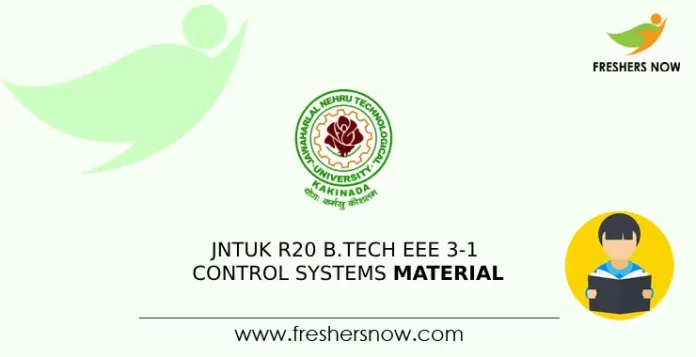
JNTUK R20 B.Tech EEE 3-1 Control Systems Material/ Notes PDF Download: In the JNTUK R20 B.Tech 3-1 Control Systems Material, students delve into the intricate world of control systems with a focus on mathematical modeling and analysis. This material equips students with the necessary tools to understand the mathematical models of physical systems, utilizing techniques such as block diagram algebra and signal flow graphs to determine overall transfer functions. Moreover, students explore the time response of first and second-order systems, with an emphasis on enhancing performance through the implementation of PI, PD, and PID controllers. The course also delves into stability analysis of closed-loop systems, employing Routh’s stability criterion and the root locus method.
JNTUK R20 B.Tech 3-1 Control Systems Material – Units
| No. Of Units | Name of the Unit |
| Unit – 1 | Mathematical Modeling of Control Systems |
| Unit – 2 | Time Response Analysis and Controllers, Stability Assessment Techniques |
| Unit – 3 | Frequency Response Analysis |
| Unit – 4 | Classical Control Design Techniques |
| Unit – 5 | State Space Analysis of Linear Time-Invariant (LTI) Systems |
Unit 1 Syllabus PDF Download | JNTUK R20 B.Tech 3-1 Control Systems Material
Mathematical Modeling of Control Systems: Classification of control systems – open loop and closed loop control systems and their differences – Feedback characteristics – transfer function of linear system, differential equations of electrical networks translational and rotational mechanical systems – transfer function of Armature voltage controlled DC servo motor – block diagram algebra – signal flow graph – reduction using Mason’s gain formula.
| JNTUK R20 B.Tech Control Systems Material – PDF Download | |
| To Download JNTUK R20 B.Tech EEE CS Material Unit 1 Notes PDF | Download PDF |
Unit 2 Syllabus PDF Download | JNTUK R20 B.Tech 3-1 Control Systems Material
Time Response Analysis and Controllers: Standard test signals – time response of first and second order systems – time domain specifications – steady-state errors and error constants – effects of proportional (P) – proportional-integral (PI) – proportional derivative (PD) – proportional integral derivative (PID) systems.
Stability Assessment Techniques: The concept of stability – Routh’s stability criterion – limitations of Routh’s stability, root locus concept – construction of root loci (simple problems) – Effect of addition of Poles and Zeros to the transfer function.
| JNTUK R20 B.Tech Control Systems Material – PDF Download | |
| To Download JNTUK R20 B.Tech EEE CS Material Unit 2 Notes PDF | Download PDF |
Unit 3 Syllabus PDF Download | JNTUK R20 B.Tech 3-1 Control Systems Material
Frequency Response Analysis: Introduction to frequency domain specifications – Bode diagrams – transfer function from the Bode diagram –Polar plots, Nyquist stability criterion- stability analysis using Bode plots (phase margin and gain margin).
| JNTUK R20 B.Tech Control Systems Material – PDF Download | |
| To Download JNTUK R20 B.Tech EEE CS Material Unit 3 Notes PDF | Download PDF |
Unit 4 Syllabus PDF Download | JNTUK R20 B.Tech 3-1 Control Systems Material
Classical Control Design Techniques: Lag, lead, lag-lead compensators – physical realization – design of compensators using Bode plots.
| JNTUK R20 B.Tech Control Systems Material – PDF Download | |
| To Download JNTUK R20 B.Tech EEE CS Material Unit 4 Notes PDF | Download PDF |
Unit 5 Syllabus PDF Download | JNTUK R20 B.Tech 3-1 Control Systems Material
State Space Analysis of Linear Time-Invariant (LTI) Systems: Concepts of state – state variables and state model – state space representation of transfer function – diagonalization using linear transformation – solving the time-invariant state equations – State Transition Matrix and its properties- concepts of controllability and observability.
| JNTUK R20 B.Tech Control Systems Material – PDF Download | |
| To Download JNTUK R20 B.Tech EEE CS Material Unit 5 Notes PDF | Download PDF |
For more details about JNTUK R20 B.Tech 3-1 Control Systems Material PDF Download and other materials follow our official website Freshersnow.com.
JNTUK R20 B.Tech 3-1 Control Systems Notes – Outcomes
- In this course on Control Systems, students learn to derive transfer functions for physical systems and determine their overall transfer functions by employing block diagram algebra and signal flow graphs.
- They also delve into analyzing the time response specifications of second-order systems and calculate error constants.
- Moreover, students explore the absolute and relative stability of Linear Time-Invariant (LTI) systems using Routh’s stability criterion and the root locus method.
- Additionally, they analyze the stability of LTI systems using frequency response methods.
- Furthermore, students design Lag, Lead, and Lag-Lead compensators to enhance system performance based on insights drawn from Bode diagrams.
- Finally, the course introduces students to representing physical systems as state models, enabling them to determine system responses, while also understanding the crucial concepts of controllability and observability.



